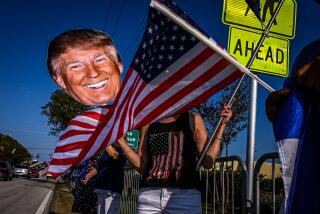Day After, Clinton Picks Up the Pace
- Share via
WASHINGTON — On the day after being acquitted on impeachment charges, President Clinton spent a busy Saturday morning in the Oval Office, outlining in his weekly radio address his concerns about the ethnic fighting in Kosovo and preparing for an overnight trip today to Mexico.
As he moves to recapture the pace of his presidency, Clinton and his aides are plotting a return to normalcy. On his agenda: domestic travel intended to gin up political support for the central elements on his policy agenda, fund-raisers for political allies and more frequent appearances in public--greeting crowds, even meeting with reporters.
During the five months since independent counsel Kenneth W. Starr delivered his report to Congress, White House handlers have limited any presidential activities that could be misinterpreted by the news media or lawmakers sitting in judgment of Clinton.
Now they are hoping to restore his routine.
On Saturday, Clinton arrived in the Oval Office early in the morning in tie and jacket, a senior aide said. He delivered his radio speech, met with Chief of Staff John Podesta and National Security Advisor Samuel R. “Sandy” Berger about Kosovo and did not return to his residence until midday.
“He seemed pretty relaxed,” a senior aide said. As for the staff, the aide added, “people are pretty exhausted.”
In his radio address, Clinton said that, although Europeans would provide 85% of the NATO force to be dispatched as a peacekeeping unit if talks produce a peace agreement in Kosovo, the U.S. would contribute fewer than 4,000 troops.
“The time to stop the war is right now,” he said, reiterating arguments made earlier this month that “Bosnia taught us a lesson: In this volatile region, violence we fail to oppose leads to even greater violence we will have to oppose later, at greater cost.”
Similarly, Clinton said, “World War II taught us that America could never be secure if Europe’s future was in doubt,” and if the fighting persists, “there likely will be a tremendous loss of life and massive refugee crisis in the middle of Europe.”
During the first week in months that the risk of being forced from office is no longer hanging over his head, Clinton plans to promote the key policy initiatives he hopes will define the end of his term--among them using the budget surplus to make the Social Security retirement program solvent until 2055.
In New Hampshire on Friday, he will focus on long-term health care and, symbolically, kick off his effort to help Democrats win majorities in both houses of Congress and Vice President Al Gore capture the presidency in 2000.
On Friday, he will meet at the White House with President Jacques Chirac of France.
They plan to hold a joint news conference--the first in which Clinton will have participated since mid-December without the impeachment scandal looming over him.
As he emerges from the politically imposed restrictions of the impeachment trial, advisors said the president will be seen more often in public settings, mingling with constituents and--they hope--basking in cheers from supporters.
Indeed, the president may indulge in his love of golfing after generally restricting himself to a putting green in the White House backyard to avoid the risk that pictures of him on the golf course during his trial would prompt criticism.
An outgoing politician, Clinton thrives on contact with the public. But he and his staff considered the highly public activities to which he has become accustomed too unseemly for a president being tried on charges of perjury and obstruction of justice.
“We have to wait a little bit,” White House Press Secretary Joe Lockhart said in an interview. “You all will let us know when enthusiasm isn’t interpreted as gloating.”
So, the reentry may be subtle.
On the other hand, said Douglas P. Sosnik, a senior advisor, “now that things are going to return to normal, I don’t think I would know what normal was if it sat on my lap.”
More to Read
Sign up for Essential California
The most important California stories and recommendations in your inbox every morning.
You may occasionally receive promotional content from the Los Angeles Times.













